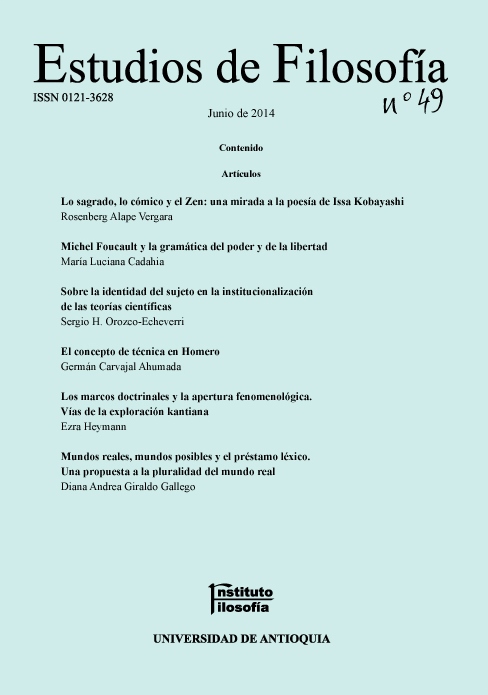Real worlds, possible worlds and lexical borrowing. A proposal to the plurality of the real world
DOI:
https://doi.org/10.17533/udea.ef.19433Keywords:
Real world, possible worlds, plurality of worlds, languages in contact, loan words, Spanish, Muisca.Abstract
The presence of loan words in a language is an indication of the introduction of a foreign word and of a new reality. Here I will discuss how the presence of loan words in languages is a sign of the plurality of the real world. For this, I follow from the thesis put forward by Lewis (1986) on the plurality of worlds and introduce examples of Muisca and Spanish, as proof that the world, as a unique place where everything is included, carries within it the plurality of the real world because there is often another that is unknown and therefore cannot be within its possible worlds.
Downloads
References
ALVAR, M. (2000) América, la lengua. Valladolid: Universidad de Valladolid, Secretariado de Publicaciones e Intercambio Editorial.
ABELEDO, H., & FLICHMAN, E. H. (1997, Diciembre) “Mundo efectivo” o “mundo real” o actualmente se traiciona así. Crítica: Revista Hispanoamericana de Filosofía (87). DOI: https://doi.org/10.22201/iifs.18704905e.1997.1070
BLOOMFIELD, L. (1961) Language. London: George Allen & Unwin LTD.
CAMPBELL, L. (1998) Historical Linguistics. Edinburgh: Edinburgh
University Press.
CRYSTAL, D. (2010) The Cambridge Encyclopedia of Language (3). Cambridge: Cambridge University Press.
DEROY, L. (1956) L’emprunt linguistique. Paris: Société d’Édition “Les Belles Lettres”. DOI: https://doi.org/10.4000/books.pulg.665
Diccionario de americanismos / Asociación de Academias de la Lengua Española. (2010). Perú: Santillana.
ENGUITA UTRILLA, J. M. (2004) Para la historia de los americanismos léxicos. Frankfurt am Main: Peter Lang.
FERNÁNDEZ DE OVIEDO, G. (1992) Historia general y natural de las indias. Madrid: Ediciones Atlas.
FITCH, G. W. (1987) Naming and Believing. D. Reidel Publishing Company: Dordrecht/Boston/Lancaster/Tokyo.
GIRALDO GALLEGO, D.A. (2011) En búsqueda de El Dorado. Préstamos de origen muisca en algunos municipios de Cundinamarca y Boyacá. (Tesis de maestría).
GIRALDO GALLEGO, D. A. (En prensa). Préstamos léxicos en el muisca. Bocabulario de la lengua Chibcha o Mosca, Manuscrito II/2922. En Forma y Función.
GÓMEZ CAPUZ, J. (1997) Towards a Typological Classification of Linguistic Borrowing (Illustrated with Anglicisms in Romance Languages). Revista Alicantina de Estudios Ingleses, págs. 81-94. DOI: https://doi.org/10.14198/raei.1997.10.08
HAUGEN, E. (1950, Apr - Jun) The Analysis of Linguistic Borrowing. Language, 26 (2), págs. 210-231. DOI: https://doi.org/10.2307/410058
LAKOFF, G., & JOHNSON, M. (1999) Philosophy in the Flesh. The Embodied Mind and its Challenge to Western Thought. New York: Basic Books. A Member of the Perseus Books Groups.
LEWIS, D. (1986). On the Plurality of Worlds. Oxford: Basil Blackwell.
LUGO, F.B. DE. (1978 [1619]) Gramatica en la lengua general del Nvevo Reyno, llamada Mosca. Madrid: Ediciones Cultura Hispánica del Centro Iberoamericano de Cooperación.
MONTES GIRALDO, J. J. (1986) El influjo indígena en el español de Colombia. Caracterización sumaria. Revista de Filología Románica (IV). Págs. 335-340.
MORÍNIGO, M. A. (1964) La penetración de los indigenismos americanos en el español. Presente y futuro de la lengua española (pags. 217-226). Madrid: Publicaciones de la asamblea de filología del I Congreso de Instituciones Hispánicas.
MUYSKEN, P. (2010) Scenarios for Language Contact. En R. Hickey (Ed.), The Handbook of Language Contact. Malden M.A.: Wiley-Blackwell. Págs. 265-281. DOI: https://doi.org/10.1002/9781444318159.ch13
SALA, M. (1988) El problema de las lenguas en contacto. México D.F.: Universidad Nacional Autónoma de México.
TODOROV, T. (1982) La conquête de l’Amérique. La question de l’autre. Paris: Éditions du Seuil.
WEINREICH, U. (1964) Languages in Contact. Findings and Problems. London-The Hague-Paris: Mouton & Co.
Downloads
Published
How to Cite
Issue
Section
Categories
License
Copyright (c) 2014 Diana Andrea Giraldo Gallego

This work is licensed under a Creative Commons Attribution-NonCommercial-ShareAlike 4.0 International License.
Authors who publish with this journal agree to the following terms:
1. The Author retains copyright in the Work, where the term "Work" shall include all digital objects that may result in subsequent electronic publication or distribution.
2. Upon acceptance of the Work, the author shall grant to the Publisher the right of first publication of the Work.
3. The Author shall grant to the Publisher a nonexclusive perpetual right and license to publish, archive, and make accessible the Work in whole or in part in all forms of media now or hereafter known under a Creative Commons Attribution-NoCommercia-ShareAlike (CC BY-NC-SA 4.0), or its equivalent, which, for the avoidance of doubt, allows others to copy, distribute, and transmit the Work under the following conditions: (a) Attribution: Other users must attribute the Work in the manner specified by the author as indicated on the journal Web site;(b) Noncommercial: Other users (including Publisher) may not use this Work for commercial purposes;
4. The Author is able to enter into separate, additional contractual arrangements for the nonexclusive distribution of the journal's published version of the Work (e.g., post it to an institutional repository or publish it in a book), as long as there is provided in the document an acknowledgement of its initial publication in this journal;
5. Authors are permitted, and Estudios de Filosofía promotes, to post online the preprint manuscript of the Work in institutional repositories or on their Websites prior to and during the submission process, as it can lead to productive exchanges, as well as earlier and greater citation of published work (see The Effect of Open Access). Any such posting made before acceptance and publication of the Work is expected be updated upon publication to include a reference to the Estudios de Filosofía's assigned URL to the Article and its final published version in Estudios de Filosofía.















